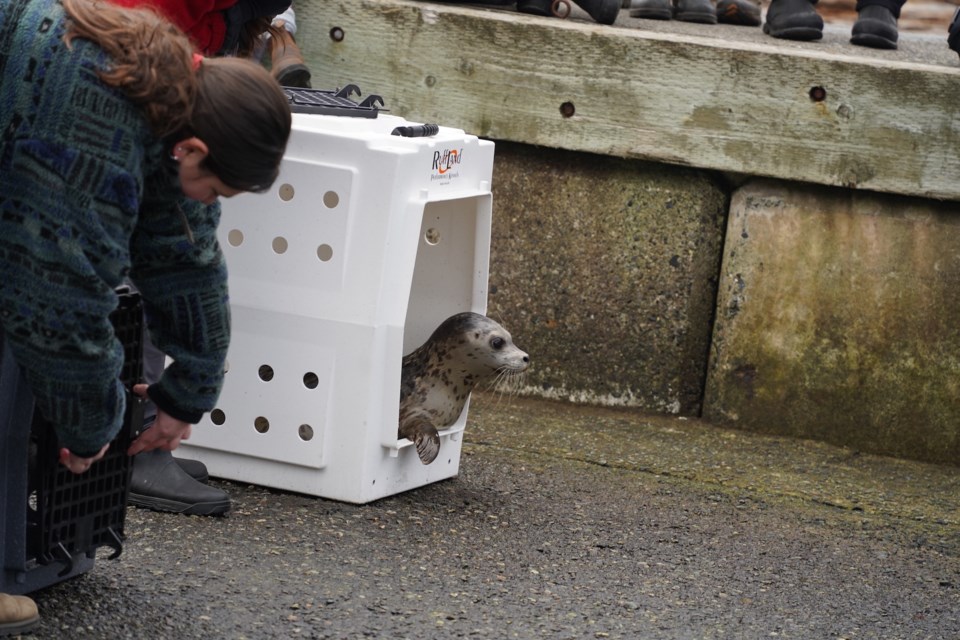Is there anything cuter in this world than a baby animal? The answer is yes; multiple rescue baby harbour seals being released back into the ocean for Christmas.
On Dec. 12, the Vancouver Aquarium Marine Mammal Rescue Society (VAMMR) released the final eight pups of the year in their care back into the ocean at Porteau Cove Provincial Park.
The release
“We have eight big fat harbour seal pups ... that are being released today and it's very exciting,” VAMMR executive director and Vancouver Aquariam veterinarian, Dr. Martin Haulena told The Squamish Chief.
Aged between four and five months old, Alcatraz, Bali, Blossom, Ravioli, Bahamas, Lucky, Wobble and Binson were all rehabilitated in time to be released for Christmas.
“They've been with us since they were really little, sometimes days old and for a lot of them, it's really the first time they're going back into the open ocean.
“So they'll take some time going in, some of them you'll see, they'll turn around and go back into the transport carrier, but some will kind of go, this is cool [and go straight in]."
Usually, the team sends rehabilitated seal pups back into the ocean in groups of three or four, but during this festive season, they decided to send all eight back home for the holidays.
But despite spending the last few months together, Haulena said the pups are likely to go off on their own adventures.
The rehabilitation
Haulena said that VAMMR usually gets between 80 and 120 rescue seal pups a year.
“July is kind of a peak for us, going into August. Harbor seal pupping season is a very narrow period of time, and they all kind of pup in the same three or four-week period,” he said.
“They're usually coming to us days or weeks old, sometimes very, very young, still with an umbilicus attached.”
He said most of the pups that end up with VAMMR are a result of maternal separation reasons.
“Usually, it’s due to human activity; people just doing their thing and not letting animals do what they need to do, so it's an urban wildlife issue,” Haulena said.
“We don't go into parks looking for seals; they kind of come to us, and then it's a matter of slowly refeeding them and addressing all those emergency things on the front end, which is metabolic disorders and hyponatremia and hypoglycemia, hypothermia.”
The seal pups can also have secondary problems such as wounds, bird pecks, dog and seal bites as well as boat trauma and entanglement issues.
In order to be released back into the wild, the seal pups have to bulk up to a healthy weight.
“We've got a minimum release weight of about 24 kilograms. They usually come to us at about six to eight kilograms. So getting them to that weight, and feeding on their own, free of any infectious disease [is our goal]...and then off they go back home,” Haulena said.
“This year, we're running just over 80% release rate, so success rate, which is really fantastic, and a huge kind of kudos to the volunteers that do everything.”
VAMMR uses Porteau Cove Provincial Park as one of many locations to reintegrate rescue seals back into their natural habitat.
“We release them here on purpose. We have other harbour seals, so we know this is a good habitat for them [because] there's plenty of resources ... but invariably, they will move off and go quite some distances,” he said.
How to get involved
For anyone who wants to get involved in the rescue and rehabilitation of marine mammals, VAMMR takes on new volunteers every year.
VAMMR assistant manager Emily Johnson said the best way to apply is through their website.
“We're coming into our slower season now. But what we'll do is, if people want to get involved, we do have a volunteer program,” Johnson said.
“We do a recruitment process in the spring and we accept applications for new volunteers.”
Currently, VAMMR has over 200 volunteers working with them.
Visit the Vancouver Aquarium Marine Mammal Rescue Society website for more information on how to get involved with the team's rescue efforts.



